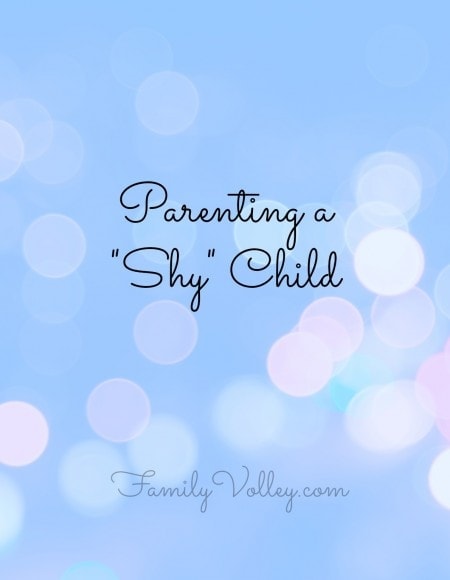Heather here from FamilyVolley.com. We shouldn’t be surprised when we have kids, to find that each of our children are different. They like different activities, are scared of different things, and some are more outgoing than others. Today we are talking about those kids of ours who are not quite as outgoing as their siblings and peers. You know, the ones we label “shy.” Here are 9 tips for parenting a shy child and growing to love them more and more along the way.
DON’T BE EMBARRASSED
It can be embarrassing to have our 4 year old hiding behind our legs, refusing to talk to our friends, or co-workers. We think it makes us appear like we don’t have control over our children, or that they don’t respect us enough to OBEY. Or that we haven’t taught them. We have to get over those thoughts. If others judge, it is their problem. We know our children best. We need to do what is best for them. We can’t let what others think affect our actions.
DON’T LABEL YOUR CHILDREN-Stop calling them shy!
It is no secret, when we label our children, they are more likely to “become” that label. Doesn’t matter if the label is good or bad. When your child gets asked a question, and refuses to answer, the last thing you want to say is “he is just shy”. The more you say it, the quieter your child will become. Don’t let others label your child either. “Are you shy?” shouldn’t be something your child has to hear from others.
EXPOSE YOUR CHILD TO ALL DIFFERENT SITUATIONS
Don’t shelter your child. Expose them to lots of different situations with different people. Give them opportunities to be social, but don’t force them to perform. Expose them to lots of new experiences and opportunities.
PRACTICE SOCIAL SKILLS
Role play is one of the most important teaching tools we have as parents and can really help build your child’s confidence. Practice making eye contact. Practice what to say when they meet someone new. Practice how to introduce themselves. Practice speaking loud enough so others can hear them. This will empower your child and take the “scary” out of situations. They will not only know what to expect, but how to handle it when it happens.
PREPARE YOUR CHILD BEFORE HAND
Preparation is so powerful. Explain to your child what will take place in the upcoming situation. Explain that there will be new people who want to say hello and ask them their names and shake their hands. Give them a good idea of what will happen so they are not caught off guard. Don’t just explain what will happen, but talk about what you expect them to do also.
ARRIVE EARLY AT SOCIAL GATHERINGS
Arriving early to social situations, gatherings, parties, or any new situations. This will allow your kids a few minutes to assess the setting, and even meet a few people before everyone arrives. Sometimes kids just need a little time to adjust and feel comfortable in situations. It gives them time to warm up to the people and the environment. They are able to already establish their position in the environment instead of walking into a situation already in progress”.
DON’T RESCUE YOUR CHILD
As parents we feel the need to rescue our child. But that isn’t necessary. We don’t have to answer for them when they won’t talk. Just go on with the conversation and let your child participate when they are ready.
DON’T FORCE OR PRESSURE
Pressure turns into a power struggle where your child will act exactly how you don’t want them to act, just to prove that they are in control.
TAKE ADVANTAGE OF COMFORTABLE SITUATIONS
When your family is together and you know your child is comfortable, give them the opportunity to lead and be in charge. Use situations that are already occurring and give them special tasks and assignments. If you are LDS, a great place to do this is Family Home Evening. Give your child the opportunity to conduct the meeting. Teach them public speaking skills, and let them practice.
All kids are different. Instead of labeling our children as shy, work with them a little and you will not only see huge differences in their actions but your relationship will be strengthened along the way as you are patient, understanding, and show love.
DO YOU HAVE A CHILD THAT IS LESS OUTGOING AND MORE RESERVED? WHAT DO YOU DO?

My daughter is usually very outgoing and very outspoken. However, she’s not immune to bouts of shyness. Whenever that happens, I am careful not to label her as shy, especially in front of her. Instead, I’ll say something like, “she’s choosing not to talk right now.” I hope it’s teaching her that we’re always making choices, and some are going to be better than others!